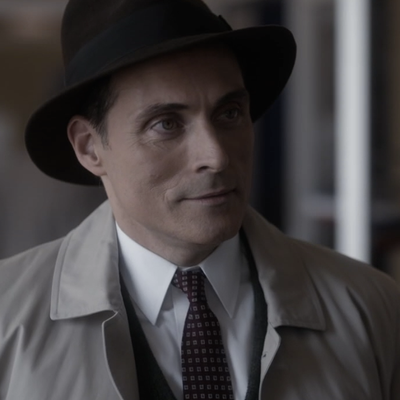
The sixth episode of The Man in the High Castle is the best one yet, which also makes it the best dramatic hour of TV produced by Amazon Studios. It’s dense in character development and narrative, it features strong design, and the actors’ performances have never been better. It plays with Americana in brilliant ways — along with our expectations of what this show will be — while pushing the story toward an arc that will carry through the rest of the ten-episode season.
“Three Monkeys” opens with Joe (Luke Kleintank) as he heads to Smith’s (Rufus Sewell) house for VA Day, the celebration of the end of WWII, which happened in 1947 in this alternate vision of history. The scene looks more like Norman Rockwell’s America than a country run by Nazis. There are fun-house reflections of iconic Baby Boomer imagery throughout the episode, especially in the opening scenes that feature flags flying, family dogs, Doris Day dresses, and big-band music on the soundtrack. It’s a very clever subversion of what we expect from a mid-century period piece. However, the casual proclamations of “Sieg Heil” from neighbor to neighbor still drip with menace.
While Juliana (Alexa Davalos) and Frank (Rupert Evans) try to put the pieces of their life back together, Joe chitchats with Smith’s family. He even throws a baseball around the backyard with Smith’s kid. (The Joe DiMaggio reference aside, this led me to wonder if Major League Baseball exists in this world.) Juliana continues to be evasive with Frank. Can they pick up a normal life despite the tragedies between them? Meanwhile, Smith, costumed in a pullover sweater like he’s Ward Cleaver, asks Joe to join him on a trip to the airport to pick up his mother-in-law.
Juliana goes back to the Nippon Building, where she meets with Tagomi (Cary-Hiroyuki Tagawa). She will work for the Trade Minister, greeting guests and making them more comfortable with an American face. Tagomi and Juliana seem to regard each other skeptically, but almost respectfully. It’s as if she knows he’s a bit subversive, and he might be willing to look the other way. Kido (Joel de la Fuente), on the other hand, is determined to find the shooter of the Crown Prince. He spoke to the witnesses who saw Frank toting a gun in the crowd. Kido and Yoshida (Lee Shorten) track down the firearms dealer at American Artistic Handcrafts. He’s evasive, telling them a story about three bullets sold to a Mr. Matsuda from Tibet. He tries to push them off Frank’s trail. Will his story work?
Smith and Joe run into Wegener (Carsten Norgaard) at the airport. Wegener is the connective tissue of the show’s narratives in so many ways. (Again: It’s ridiculous that Norgaard isn’t in the opening credits.) Smith invites Wegener into his home for VA Day with a casual and warm, “Let’s get you fed.” They’re old friends, and Wegener tells Joe that he couldn’t ask for a better mentor. Wegener is evasive about his visit to the Pacific States. Smith seems suspicious. What does he know?
A series of great dialogue scenes around the Smith household comprise the bulk of “Three Monkeys.” We learn that VA Day isn’t celebrated in the Pacific States, likely adding to the tension between the Japanese and the Nazis. Wegener talks about not seeing his kids. Smith seems melancholic when his old friend brings up how much he used to sail. It’s hard out there for a Nazi. Is Joe being groomed to be the next Smith? Does Smith want to be a father figure for him?
Either way, Joe is curious. The next scene uses a clever bit of editing to parallel him and Juliana, as they conduct searches on opposite ends of the continent. Joe is looking through Smith’s office for information about the Man in the High Castle, while Juliana tries to find her mysterious contact, Sakura Iwazaru, in the Nippon Building. He comes back with pretzels; she gets a security pass. Even more important, Juliana learns that something fishy is going on — Sakura translates to “Cherry Blossom” and Iwazaru translates to “Speak No Evil.”
Meanwhile, Kido suspects that Tagomi is hiding something from him, especially after learning that a high-ranking Nazi (Wegener) was on the platform when the Crown Prince was shot, and that same Nazi was basically allowed to leave the Pacific States without being questioned.
Another sharp scene of dialogue between Joe, Smith, and Wegener follows. The conversations feel sharper in this episode. They’re much more tight and genuine. In this sequence, the characters finally reference the Holocaust and the horrible things they’ve seen. (“Nobody talks about the camps.”) Wegener, who has a deeper reservoir of regret, closes the door on this potentially emotional conversation with a single line: “At least now we have better whiskey.” Smith responds, “Now we have a better world.” Men like Smith want to convince themselves that they’re forces of good, but it’s clear that even the Nazis are questioning what they’ve done and where their country is headed.
A series of slight screenwriting missteps follow, but thankfully, they’re brief. When the arms dealer arrives to threaten Frank, the scene feels too forced. (If you thought someone had used your bullets to assassinate someone, would you really think he’s sane enough to be threatened?) Then, Juliana and Joe get into a lame fight. She reveals that she killed a man in Canon City, and that she had help from a man from the East Coast Resistance. He flips out about that last bit. With everything that’s happened to him, is he really jealous? The scene ends with Frank storming out, even though it seems fair to presume that he’d have a lot more on his mind than infidelity.
In a conversation with Joe, Smith reveals that he knows Wegener lied about his trip to the Pacific States. He actually went to the airport to question him; his mother-in-law has been dead for two years. When Smith invited Weneger back to his house, he was hoping that he would confide in him. This is Sewell’s best performance, especially as Smith mourns the fact that his old war buddy didn’t ask him for help. With just the right mixture of regret and pride, he explains how World War II changed them: “Me and Rudolph, we performed duties together that bond men. They bond men forever.” And then, he reports Wegener to the Nazis.
While Frank attends a Jewish service with the man who attended his sister’s memorial service, we get the major revelation of this week’s episode — the real meaning of Sakura Iwazaru. When Juliana notices that the rooms are named after flowers (the Bara Room is named after the Japanese word for rose), she begins to looks for the Sakura Room. When she brings in tea, she discovers that it’s a monitoring room; whenever a conversation mentions The Grasshopper Lies Heavy, for example, it’s written on a card and placed in a bin. She grabs the card from the bin — then spots her stepfather working in a back room. Did HE sell out Trudy?
Meanwhile, Joe finds the “Grasshopper” folder in Smith’s office, but it’s empty. The light flickers on. Smith is standing in the doorway. Uh oh.
Other Notes:
- When the arms dealer tells Frank he doesn’t need his “gaijin stupidity,” you may have wondered what that meant. Gaijin is Japanese for foreigner.
- Two excellent music cues this week: a big-band version of “Mack the Knife” plays in the opening scene, and a muzak version of “Runnin’ Wild” plays at the airport when Smith and Joe run into Wegener.
- Though this was a transitional episode, it was still well-refined. Sewell gets his juiciest scenes yet, while the narrative arc for the rest of the season ramps up like a play after intermission.
- “Three Monkeys” was directed by Nelson McCormick, one of the most experienced directors to work on the show. He’s filmed everything from ER to Third Watch to Southland, and his veteran know-how clearly showed in this grounded, excellent episode.


